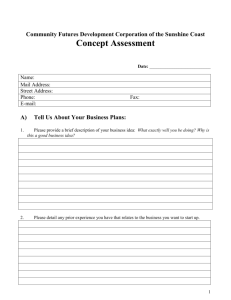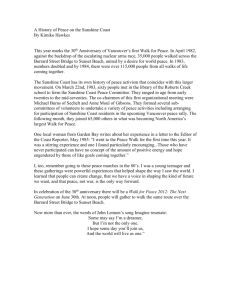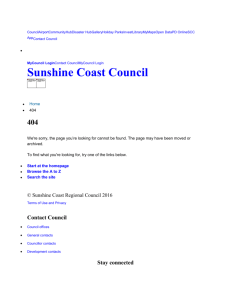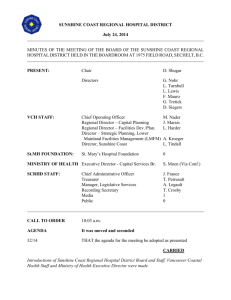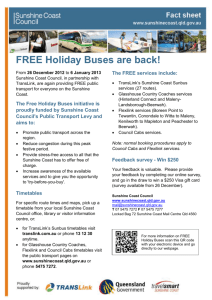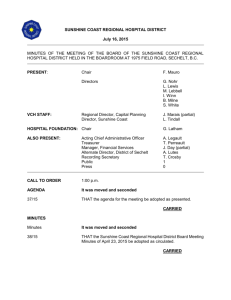Chapter 1 Business Plan Workbook
advertisement
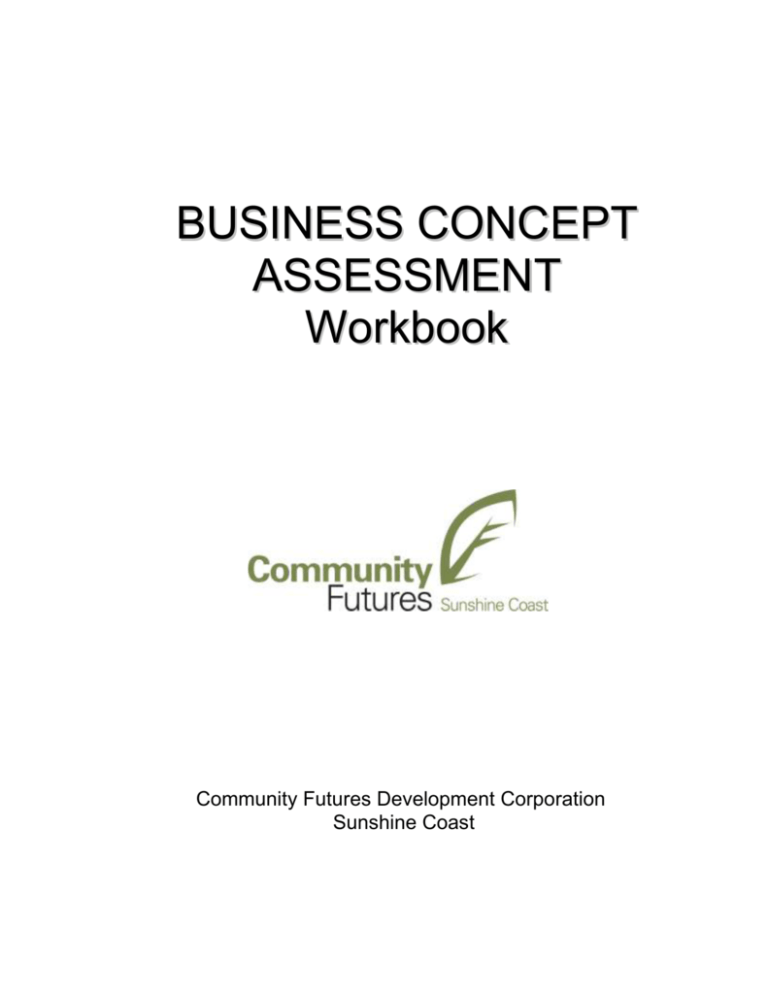
BUSINESS CONCEPT ASSESSMENT Workbook Community Futures Development Corporation Sunshine Coast Community Futures Development Corporation of the Sunshine Coast Business Concept Assessment Workbook Table of Contents 1 WHY START A SMALL BUSINESS? ..........................................................3 WHY START A SMALL BUSINESS? .............................................................3 MOTIVES FOR STARTING AND OPERATING A SMALL BUSINESS .................4 TEN MYTHS OF STARTING A SMALL BUSINESS………………………..… 5 2 MARKET RESEARCH [QUESTION 8] ........................................................ 6 TYPES OF MARKET RESEARCH…………………………………………...6 PPRIMARY RESEARCH ..................................... …………………………6 SECONDARY RESEARCH ...........................................................................7 3 MARKETING YOUR BUSINESS [QUESTION 9 & 10]……..………………8 INTRODUCTION ....................................................................................…8 WHY PEOPLE BUY ....................................................................................8 PROMOTION AND SELLING .....................................................................10 4 COMPETITOR ANALYSIS (QUESTION 11) ..............................................11 STRENGTHS AND WEAKNESSES..............................................................12 5 FINDING THE MONEY TO START [QUESTION 22] ..............................15 TYPES OF BUSINESS LOANS.. ..................................................................16 SOURCES OF FUNDS.. 6 .............................................................................17 INFORMATION AND RESOURCES ...........................................................18 Community Futures Development Corporation of the Sunshine Coast (CFDC-SC) has prepared this Business Concept Assessment Workbook for use by its clients and instructors. No portion of this document may be reproduced, by any means, without the prior written permission of CFDC-SC. 08/03/16 -2- Community Futures Development Corporation of the Sunshine Coast Business Concept Assessment Workbook Starting a Small Business My Notes Why Start a Small Business? Completing the following sentences should help you to better understand your personal motivations for starting a small business: 1. I am going to start my own business because: 2. I want to start my own business but: 3. My main motivation for starting a business is: 4. When I talk about starting my own business, my family, friends and relatives think: 5. People are successful in business because: 08/03/16 -3- Community Futures Development Corporation of the Sunshine Coast Business Concept Assessment Workbook Motives for Starting & Operating a Small Business My Notes What do you think are the top six motives of people starting a small business? 1. 2. 3. 4. 5. 6. List the top six motives of people continuing a successful business 1. 2. 3. 4. 5. 6. Research shows that these motives are relatively universal. However, market conditions and the state of the economy will affect the ranking of importance of each item. 08/03/16 -4- Community Futures Development Corporation of the Sunshine Coast Business Concept Assessment Workbook Ten Myths of Starting a Small Business My Notes Before starting your business, consider whether or not you may be falling for some of the common myths about starting a business. 1. It’s easy. 2. I can get a government grant to get started. 3. My product or service will sell itself. 4. I will be able to enjoy lots of leisure time because I’m my own boss. 5. I can hire someone to do the stuff I don’t like to do. 6. I will get rich. 7. I don’t have to like what I do to make money in my business. 8. The competition is really poor at what they do. 9. I can do it cheaper than everyone else can. 10. Because I have better quality, everyone will want my product or service. 08/03/16 -5- Community Futures Development Corporation of the Sunshine Coast Business Concept Assessment Workbook Market Research My Notes Types of Market Research There are two types of market research: primary and secondary. You may find your need to do both in order to prepare your marketing plan. Primary Research Primary Research is information that you collect. You may collect the information personally or hire somebody to collect it for you. Primary research may be necessary and helpful to provide information in areas that secondary research cannot. Sources of primary research include: 08/03/16 Personal Interviews Telephone Surveys Observational Techniques Mail Surveys Focus Groups Personal Interview or Telephone Survey -6- Community Futures Development Corporation of the Sunshine Coast Business Concept Assessment Workbook Market Research (continued) My Notes Secondary Research Secondary Research uses information that already exists. You will collect information according to the questions you have about: demographics customer characteristics environment Demographics Examples of statistics available include: Population of trade area, number of households Gender, age, income, occupation, education Customer Characteristics You will also need to determine who your ideal customers are: What proportion of the population has a need for your product? How does that translate into actual numbers? Is your product viewed as a necessity or a luxury? What price are they willing to pay? What do they presently buy, and where do they buy it and why? How often do they buy? What is important about your product or service to customers? Who in the household/business makes the decision? Environment There are many outside influences that may positively or negatively affect the success of your business. Environmental influences include: Governmental regulations and incentives Social and cultural changes Economic forces Technological change You might begin with Secondary Research, then conduct some Primary Research to test your assumptions or refine the information you receive. A complete market research program will likely include both. Some sources for Secondary Research are: 08/03/16 School Board Office and Regional Government Offices Downtown Business Associations and Trade Associations Newspapers, Radio, TV, internet Statistics Canada and B.C. Statistics Trade Publications, magazines, library -7- Community Futures Development Corporation of the Sunshine Coast Business Concept Assessment Workbook Marketing Your Business My Notes Introduction Many new business owners believe that if they produce a quality product at a good price their business will establish itself in the marketplace. Although this could be the case, it is very unlikely that your business will “sell itself” without any thought given to how it will be marketed. THE CUSTOMER IS NOT BUYING YOUR PRODUCT OR SERVICE THEY ARE BUYING THE SOLUTIONS AND BENEFITS YOUR PRODUCT OR SERVICE PROVIDES Why will they buy from you? 1. Why People Buy People buy goods and services to satisfy their needs and wants. These might be physical needs – food, shelter, clothing, transportation, etc. People also buy to satisfy emotional needs – prestige, safety, pleasure, convenience, comfort, etc. Once a person’s basic needs have been met, their purchases are largely motivated by emotional needs. 2. The Features = Benefits = Needs Equation Your product or service has certain features which give it utility and value. For a car, the features might include: gas mileage, engine power, luxurious interior, cargo room, etc. Each feature conveys a benefit to the buyer: more economy of operation, faster speed, softer seating, storage capacity, ease of loading, etc. The distinction between benefit and need may sometimes be hard to separate, and may be an obvious characteristic of the feature For example; designer clothing offers the feature of a brand name; the benefit and need are the same – prestige, image. 08/03/16 -8- Community Futures Development Corporation of the Sunshine Coast Business Concept Assessment Workbook These benefits then answer the physical and emotional needs of your customer as summarized in this table: Feature Low gas consumption Powerful engine Luxury interior Cargo room (van) Benefit Economy, money saving Faster speed, passing ability Attractive, comfortable, convenient Extra storage space, holds bulky objects Need Financial security, responsibility Safety, convenience, prestige Aesthetic, comfort, convenience, prestige Convenience Fill in the form below for your product or service: Feature Benefit Needs 3. Advertising and Sales The feature/benefit/needs equation forms the basis of your advertising message and your sales presentation. Remember, your customer is interested in one thing only – “What’s in it for me?” 08/03/16 -9- Community Futures Development Corporation of the Sunshine Coast Business Concept Assessment Workbook Marketing Your Business My Notes Promotion and selling Successful marketing campaigns will include a combination of these four activities: 1. Advertising Advertising establishes your name, your image, your product, its features, etc. Benefits: It tells your market who you are, where you are, and what you do. 2. Promotion Promotions ask the potential customer to act, eg. “Return this coupon for a discount”, or “Call for your free estimate today”. 3. Sales Unless you are selling by mail order catalogue, or on the Internet, you will likely be involved in “face-to-face” selling. The same formula, Features = Benefits = Needs will help you plan your sales presentation. 4. Public Relations Creates a favourable image for your company within the community. Activities include: sponsorship of sports teams, contributions to local charities, participation in community service clubs, etc. Some frequently used forms of advertising and promotion are: Print Media, newspapers, magazines, programs, telephone and other directories, catalogues, press releases, newsletters, flyers Broadcast Media, Radio, TV, cable, Internet Business Supplies, business cards, letterhead Internet website, e-mail newsletter (e-zines) Point of Sale Promotions, tent cards, window signs, displays, window displays Premiums e.g. pens, key chains, coupons Taste testing, sampling, trade shows Networking, personal contacts, sales presentations 08/03/16 - 10 - Community Futures Development Corporation of the Sunshine Coast Business Concept Assessment Workbook Competitor Analysis My Notes Information about your competitors will help in your planning. Answers to the following questions will provide the information you need. Who are your competitors? Will you compete directly or indirectly (substitute product/service) with them? How many competitors are in the industry? Is the number increasing or decreasing? Are your competitors profitable? Is the Target Market growing or shrinking? What are the competitors’ price structures? What are the sales and market shares of each of your competitors? How are your competitors positioned? Is your industry seasonal? Where and how do your competitors advertise? 08/03/16 - 11 - Community Futures Development Corporation of the Sunshine Coast Business Concept Assessment Workbook Competitor Analysis (continued) My Notes Strengths and Weaknesses Having completed an analysis of your competition, you are now able to evaluate your competitors’ strengths and weaknesses. The table below provides an example of strengths and weaknesses. Strengths Weaknesses Competitor #1 Experienced staff Open late Weak product selection Competitor #2 High traffic location Open late High minimum order requirement Competitor #3 Regular customers Promotions Poor customer service Based on your research, describe your direct and indirect competitors’ strengths and weaknesses. Competitor’s Name Competitor’s Products/Services Competitor’s Strengths Competitor’s Weaknesses Competitor’s Name Competitor’s Products/Services Competitor’s Strengths Competitor’s Weaknesses 08/03/16 - 12 - Community Futures Development Corporation of the Sunshine Coast Business Concept Assessment Workbook Competitor’s Name Competitor’s Products/Services Competitor’s Strengths Competitor’s Weaknesses Competitor’s Name Competitor’s Products/Services Competitor’s Strengths Competitor’s Weaknesses My Notes Now, after studying your competitor’s strengths and weaknesses, you will need to review your plan by answering these questions: 1. How will you compete with your competitors? 2. How will you differentiate from your competitors? 08/03/16 - 13 - Community Futures Development Corporation of the Sunshine Coast Business Concept Assessment Workbook 3. Why will you be successful? 4. What difficulties do you envision? 5. Where did you get the information about your competitors? 6. What effect, if any, does this information have on your business plan? 08/03/16 - 14 - Community Futures Development Corporation of the Sunshine Coast Business Concept Assessment Workbook Finding the Money to Start “A good business idea and thorough business plan to back it up helps to find the money to start.” How Banks Decide to Make Loans How banks decide to lend money is not as large a mystery as it may first appear. All banks and lending officers use a standard process for reviewing loan applications based on the 5 C’s of lending: Credit _: Your credit history and payment record. Collateral_____: Assets you have that you are able to give the bank as security to guarantee repayment of the loan. Character_____: Your personal attributes including your work history and length of time at your residence. Capacity______: How much you are able to pay and borrow - maximum amount of debt should not exceed 40% of your gross income. Capital_______: How much of your own money you are contributing. Key Points to Remember 1. Bring your Business Plan. If you don’t have your business plan with you, you may be asked to bring it to a second appointment. 2. Be honest and forthright. Make sure the information you provide is up-to-date and accurate. The bank or credit union will check much of the information. 08/03/16 - 15 - Community Futures Development Corporation of the Sunshine Coast Business Concept Assessment Workbook TYPES OF BUSINESS LOANS Banks and other lenders offer many different “loan packages”. These packages often have different names and may appear to be significantly different from one another. In reality, all loan packages are based on three main types of loans: Term Loans: These are loans given to buy “hard” assets such as equipment and property. They are “term” loans because they are repaid over a set period of time - or, loan term. The term of the loan varies - usually in months and years. The term may be as short as 6 months or extend up to 25 years in the case of a mortgage. Interest rates can be fixed for the loan term or vary with the lender’s prime lending rate. In some cases, there may be a penalty for repaying before the end of the term. Demand Loans: These are loans that are payable “on demand” by the lender. Most small business loans are demand loans. Interest rates are given at the lender’s prime interest rate plus a percentage above that rate, for example, prime plus 2%. In some cases, only interest payments are made on the loan with the principal coming due at a specific date. Line of Credit: This is a short-term loan to meet short-term operating expenses such as inventory, accounts payable, or advertising. Lines of credit operate on a revolving basis, in the same way as most credit cards. You may borrow up to a maximum limit but the amount that you borrow depends on your needs and the loan balance fluctuates. Lines of credit are usually only given to stable businesses with a proven track record. Financing in General: There are various stages in the life of a small business and all will require financing. A business without a track record normally will have a difficult time raising funds. Government Grants versus Loans: Generally, government grants for small businesses are not available. Funding that is available is generally geared towards exporting, high technology, or manufacturing firms and training programs. 08/03/16 - 16 - Community Futures Development Corporation of the Sunshine Coast Business Concept Assessment Workbook SOURCES OF FUNDS You: It takes money to start a business. Borrowing is possible, but only if you have sufficient funds of your own in cash, inventory or equipment to provide reasonable equity for a loan. A simple way of looking at equity is what you own. Debt is what you owe. When financial people talk about debt to equity they are comparing how much you owe to what you own. At a certain point it becomes too risky to acquire more debt. Friends and Family: After exhausting your own funds, the next source may be friends and family. This is called “love money”. This support is often available on a very informal arrangement. It is often a good idea to have a written agreement because the more business-like you are in all your dealings, the better off you are. This is especially important if family will be involved in operating the business. Many family feuds have started over who makes the decisions when money is at risk. Investors/Venture Capital: There are people with funds to invest and usually unconnected to a financial organization. Often they are willing to risk the money in exchange for involvement in managing the business. They are looking for a good return on their investment and often have a lot of expertise to share. Be prepared before you start looking. Finding investors is not easy but they can be found in the newspaper, by word of mouth, through accountants, lawyers, and real estate agents. Before you sign a contract, make sure both your lawyer and your accountant review the document. Other Sources of Funds: Suppliers: from the point of obtaining supplies on credit for 30 days or more; however, most will want cash on delivery (COD) until you have established a credit rating. The Business Development Bank of Canada provides financing, but their requirements for security, interest rates and investment are higher than chartered banks. 08/03/16 - 17 - Community Futures Development Corporation of the Sunshine Coast Business Concept Assessment Workbook INFORMATION AND RESOURCES 1. Registering a Business Name If you have decided to operate as a sole proprietorship or partnership and are using a name other than your own, you must register a business name. Registration forms are available from: Registrar of Companies 2nd Floor, 940 Blanshard St. Box 9431, Stn Prov Govt Victoria, British Columbia Victoria, BC V8W 9V3 Phone: 1-604-387-7848 Fax: 1-604-356-0206 Enquiry BC 1-800-663-7867 www.fin.gov.bc.ca/registries/corppg/crinfoctr.htm Forms: www.fin.gov.bc.ca/registries/corppg/crforms.htm OR The Local Government Agent’s Office 604-885-5187 (Sechelt) Name search fees are $30.00 for three names. We suggest you utilize all three as the fee is the same for one as three. Once a name is approved you may then register. The current registration fee is $40.00, payable by certified cheque or money order. You can mail or deliver the completed registration to: Registrar of Companies 940 Blanshard St. Victoria, British Columbia Enquiry BC 1-800-663-7867 V8W 3E6 Names/Partnership Unit Corporate Search Section Phone: 1-604-356-2893 Phone: 1-250-387-5101 Fax: 1-604-356-1428 Fax: 1-250-356-0206 Information: www.fin.gov.bc.ca/registries/corppg/crinfoctr.htm Forms: www.fin.gov.bc.ca/registries/corppg/crforms.htm OR The Local Government Agent’s Office 604-885-5187 (Sechelt) also has One Stop Business Registration – On Line If registering by mail, you can expect a 4 to 6 week wait. You can register in person, generally within a couple of hours. Legislation now requires all businesses operating under anything but the owner’s name to be registered prior to start up. Generally, all financial institutions require evidence of registration before they will open a bank account in the business name. Professional assistance from an accountant and lawyer is recommended if you decide to incorporate. There are also a number of publications you should consult to familiarize yourself with this form of ownership. 08/03/16 - 18 - Community Futures Development Corporation of the Sunshine Coast Business Concept Assessment Workbook Information and Resources (continued) How to Incorporate a Business (Self Counsel Series) Contact: Local book stores, library Incorporation Documents can be purchased from local stationery and office supply stores. To incorporate provincially, contact: Ministry of Finance, Corporate and Personal Property Registry 940 Blanshard St. Box 9431, Stn Prov Govt Victoria, British Columbia Victoria, BC V8W 9V3 Phone: 1-604-356-8648 Enquiry BC 1-800-663-7867 Info at: www.fin.gov.bc.ca/registries Many businesses are subject to provincial licenses that are designed to protect the interest and safety of the public. The Ministry of Public Safety and Solicitor General also administers the Business Practices Act, which regulates procedures that apply to any business selling products or services to the public. Under the Canada Business Corporations Act, any individual or corporation may receive a certificate of incorporation for any legal purpose with the exception of operating such institutions as banks, insurance companies, and trust and loan companies. The documents that must be completed and forward to the Director, Corporations Directorate, are the Articles of Incorporation, a Notice of Registered Head Office Address and a Notice of Directors.* To incorporate federally, contact: The Corporations Directorate Consumer and Corporate Affairs Canada 4th Floor, Place du Portage, Phase II, 50 Victoria Street, Hull, Quebec K1A 0C9 Phone: 1-819-997-1142 * A $500.00 filing fee, payable to the Receiver General, must also be submitted with these documents. 2. Provincial Sales Tax/Vendor’s Permit If your business engages in a retail venture or service business where retail sales tax applies, it is necessary to obtain a vendor’s permit. There is no charge. Tax is charged on the retail sale or rental of all products and some services (tourist accommodations and labour provided in specific sectors) and admission fares. A purchase Exemption Certificate will allow you to purchase goods for resale taxfree. For forms, registration and additional information on provincial taxes, contact: Consumer Taxation Branch 1802 Douglas Street, Box 9442, Stn Prov Govt, Victoria, BC Victoria, BC V8W 9V4 Phone: 1-250-387-1500 Fax: 1-250-387-6218 Enquiry BC 1-800-663-7867 www.rev.gov.bc.ca/ctb Forms: www.rev.gov.bc.ca/ctb/forms.htm 08/03/16 - 19 - Community Futures Development Corporation of the Sunshine Coast Business Concept Assessment Workbook Information and Resources (continued) Or Taxpayer Information Line Phone: 1-604-660-4524 Toll Free: 1-877-388-4440 Or The Local Government Agent’s Office 604-885-5187 (Sechelt) 3. Goods and Service Tax - GST According to Revenue Canada, every business or organization engaged in a commercial activity with annual sales and revenues of GST-taxable goods and services of more than $30,000 is required to register and obtain a GST registration number. Firms with annual sales of less than $30,000 may still want to register in order to claim input tax credits for GST paid on business purchases. All businesses have to pay GST on their purchases. They are then able to claim a credit, which is applied against GST charged on their sales (referred to as Input Tax Credits). The difference between the amount collected and the amount paid determines whether tax is remitted or a refund claimed. All goods and services sold are taxable under the GST at 6% except items which are zero-rated such as basic groceries or exports; and exempt items such as residential rents, health and medical services, child care services, insurance, and services provided by financial institutions. Complete details on the GST are available from Canada Customs and Revenue Agency and there is no fee to register: Canada Revenue Agency Tax Centre Box 10000 Stn Terminal Vancouver, BC V6B 6M8 Business Enquiries 1-800-959-5525 Or Canada Revenue Agency CRA Programs - www.businessregistration-inscriptionentreprise.gc.ca/ebci/brom/bro/about-e.html This Business Registration On-line (BRO) service is provided by the Canada Revenue Agency (CRA) and its provincial partners, New Brunswick, Nova Scotia, Ontario and British Columbia. Along with registering for a Business Number, you can register for these accounts: GST/HST (goods and services tax/harmonized sales tax) payroll deductions import/export corporate income tax account This account will be automatically created once you register a business that is a corporation. 08/03/16 - 20 - Community Futures Development Corporation of the Sunshine Coast Business Concept Assessment Workbook Information and Resources (continued) 4. Local Regulations It is necessary to comply with local business licensing, zoning, building, and fire regulations. Fire inspection is necessary for fire alarm systems, accessibility to exits, and gatherings of groups of people. Most cities or townships also require businesses to obtain a permit if they intend to post an exterior sign. Contact local authorities. Check with Zoning, Planning, City Clerk, and Business Inspectors. If your business is located in an incorporated municipality (city, town, village or district), obtain a business licence from the municipal business licence office. If your business is located in an unincorporated area of the province, contact the nearest regional district office. Refer to the blue pages of the telephone book for your local municipal hall. 5. Employment Standards, Occupational Health and Safety Hours of work, construction health and safety, minimum wage, overtime and vacation pay are standards regulated by the Ministry of Labour. For more information contact: Employment Standards Branch Ministry of Skills Development and Labour 201-865 Hornby St., Vancouver, B.C. V6Z 2G3 Phone: 1-604-775-1974 Fax: 1-604-775-1983 Enquiry BC 1-800-663-7867 www.labour.gov.bc.ca/esb Admin. Office Victoria: Phone: 1-250-387-1220 6. Payroll Source Deductions When hiring employees, register with Canada Customs and Revenue Agency to obtain an employer’s number and A Small Business Employer Deduction Kit. It explains requirements regarding Income Tax, Employment Insurance (EI.) and Canada Pension Plan (CPP). Business and Professional Income Tax Guides as well as Tax Interpretation Bulletins are also available from Canada Customs and Revenue Agency. For more information contact: Canada Customs and Revenue Agency, Source Deductions 1166 West Pender St., Vancouver, B.C. V6E 3H8 Phone: 1-604-669-2990 Toll Free: 1-800-663-5650 Fax: 1-604-689-7536 www.businessregistration-inscriptionentreprise.gc.ca/ebci/brom/bro/about-e.html 08/03/16 - 21 - Community Futures Development Corporation of the Sunshine Coast Business Concept Assessment Workbook Information and Resources (continued) 7. Workers’ Compensation New employers must pay Workers’ Compensation from the first day employees are on the job. Failure may result in penalties. Rates vary depending on the type of work performed. If you are selfemployed, and have no employees other than a spouse, Workers’ Compensation is optional. You may want to obtain Personal Optional Protection. If you are subcontracting you are required to either have a clearance certificate from the person you hire or you must have coverage for them. Workers’ Compensation Board of BC 6951 Westminster Highway Box 5350 Richmond, B.C. Vancouver, BC V6B 5L5 Phone: 1-604-244-6181 Toll Free: 1-888-922-2768 Fax: 1-604-244-6490 www.worksafebc.com 8. Business Insurance There are many types and areas of business insurance coverage. Common types of business insurance include business interruption, key person, premises, third party liability, property and personal coverage such as health, life and disability. Carefully research various insurance plans and decide which is best for you and your business. ICBC should be contacted about changes you may need for your vehicle use changing from personal to business. 08/03/16 - 22 - Community Futures Development Corporation of the Sunshine Coast Business Concept Assessment Workbook Information and Resources (continued) 9. Other Small Business Rules and Regulations It is impossible to cover all rules and regulations concerning all small businesses. The following chart is intended as a quick reference. Investigate further with the contacts provided. Addresses and phone numbers for most contacts are listed in the blue pages of your telephone directory. Resource Canada / BC Business Services Canada-BC Business Service Centre Government of Canada Services for Canadian Business Stategis – Canada Business and Consumer Canadian Bankers Association Canada Customs & Revenue Agency Business Enquiries Consumer Protection of BC Employment Standards Act of BC WCB – WorkSafe BC Enquiry B.C. 2010 Opportunities Local Governments Town of Gibsons District of Sechelt Sechelt Indian Government District Sunshine Coast Regional District Gibsons Chamber of Commerce Sechelt Chamber of Commerce Pender Harbour Chamber of Commerce Minimum Wage Provincial Taxes Lawyer Referral Service Statistics Canada 08/03/16 Contact Information www.smallbusinessbc.ca 1-800-667-2272 www.cbsc.org www.businessgateway.ca www.strategis.ic.gc.ca/engdoc/main.html www.cba.ca Resource center – Information booklets 1-800-959-5525 www.ccra-adrc.gc.ca 1-888-564-9963 1-800-663-3316 www.labour.gov.bc.ca/esb www.worksafebc.com 1-800-663-7867 www.2010commercecentre.com 604-886-2274 www.gibsons.ca 604-885-1986 www.district.sechelt.bc.ca 604-885-2273 604-885-2261 www.scrd.ca www.gibsonsbc.ca/chamber www.secheltchamber.bc.ca 604-883-2561 peacoc@uniserve.com 1-800-663-3316 1-604-660-4524 1-877-388-4440 1-800-663-1919 Phone: 1-800-263-1136 Fax: 1-800-263-1136 www.statcan.ca/menu-en.htm - 23 - Community Futures Development Corporation of the Sunshine Coast Business Concept Assessment Workbook Vital Statistics (BC) BC Stats SCORE – Local stats Sunshine Coast Info - general 1-800-663-8328 www.bcstats.gov.bc.ca www.score.scrd.bc.ca www.bigpacific.com Online Resources for Small Business Getting Started in Business An overview of the steps of starting a small business from the Canadian Bankers Association. www.cba.ca/en/viewPub.asp?fl=6&sl=23&docid=40&pg=1 Small Business Information Resource A collection of articles and resources for small businesses from about.com. www.sbinformation.about.com Entrepreneur Self-Assessment Quiz Take an online self-assessment to find out if you’re suited to self-employment www.bdc.ca/en/business_tools/entrepreneurial_self_Assessment Community Futures – Resource Library www.communityfutures.org Aspire Self Employment Program – Links Page www.aspireselfemployment.com/links.html 08/03/16 - 24 -
